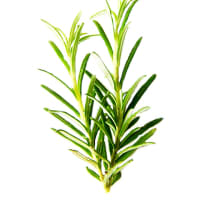Rosemary is a woody, perennial herb with fragrant, evergreen, needle-like leaves and white, pink, purple, or blue flowers, native to the Mediterranean region. The plant can live as long as 30 years.
Scientific Name: Salvia rosmarinus. Until 2017, it was known by the scientific name Rosmarinus officinalis.
Composition
Rosemary contains a number of phytochemicals, including rosmarinic acid, camphor, caffeic acid, ursolic acid, betulinic acid, carnosic acid, and carnosol. Rosemary essential oil contains 10–20% camphor.
- The rosemary contains the polyphenols carnosic acid (CA), rosmarinic acid (RA), and carnosol (COH) in high concentrations.[1]
Healing Properties
Antimicrobial
(anti-microbial)
Antibiolm activity
Antiepileptic
anticonvulsant activity against seizures.[2]
Antimutagenic
Antimutagens are agents that protect DNA from harmful mutations.
Anticancer
Pro-apoptotic and anti-proliferative
- Rosemary Extract has potent effects against prostate cancer.[1:1]
- Treatment of prostate cancer cells with Rosemary Extract resulted in a significant inhibition of proliferation, survival, migration, and tumor cell signaling.
- Treatment of prostate cancer cells with Rosemary Extract resulted in a significant inhibition of proliferation and survival.
- Normal prostate epithelial cells remained unaffected by Rosemary Extract treatment.
Antioxidant
Antiparkinson’s
The compound carnosol (from Rosemary) significantly protected brain cells from neurotoxicity and improved the cell viability.
Antidepressant
Involvement of GABAA receptors has been explained as a possible mode of action for inhibition.[2:1]
Anxiolytic
(anti-anxiety)
Carminative
(relieves flatulence)
Circulatory Stimulant
Healthy Digestion
Nervine
used to stimulate/relax the nerves.
Brain Health
Mental Stimulation
Stimulant: Three compounds (cirsimaritin, rosmanol and salvigenin) demonstrated central nervous system stimulant activity.[2:2]
Memory enhancer**
(nootropic)
Neuroprotective
Rosemary leaf extract improves tolerance against cerebral ischemia-reperfusion injury (tissue damage caused when blood supply returns to the brain tissue after a period of ischemia or lack of oxygen).[2:3]
Metabolism
Rosemary Extract improves metabolic abnormalities
Carnosic acid (CA), a major constituent of rosemary extract, has been shown to improve metabolic abnormalities. Three doses decreased body weight gain, decreased changes in lipid profile (due to increased food intake), improved Fasting Blood Glucose levels, leptin level, and mean systolic blood pressure (MSBP). Overall helped regulate glucose hemostasis in the liver.[3]
Skin Health
Disease / Symptom Treatment
Cancer
Prostate Cancer
- Rosemary Extract has potent effects against prostate cancer.[1:2]
- Treatment of prostate cancer cells with Rosemary Extract resulted in a significant inhibition of proliferation, survival, migration, and tumor cell signaling.
- Treatment of prostate cancer cells with Rosemary Extract resulted in a significant inhibition of proliferation and survival while Rosemary Extract had no effect on normal prostate epithelial cells.
Diabetes
Rosemary Extract improves metabolic abnormalities
Carnosic acid (CA), a major constituent of rosemary extract, has been shown to improve metabolic abnormalities. Three doses decreased body weight gain, decreased changes in lipid profile (due to increased food intake), improved Fasting Blood Glucose levels, leptin level, and mean systolic blood pressure (MSBP). Overall helped regulate glucose hemostasis in the liver.[3:1]
Colds/Flu
Fungal Infections
Title: Rosemary (Rosmarinus officinalis L.) extract inhibits prostate cancer cell proliferation and survival by targeting Akt and mTOR
Publication: Biomedicine & Pharmacotherapy
Date: September 2020
Archive Link ↩︎ ↩︎ ↩︎Title: Investigation of rosemary herbal extracts (Rosmarinus officinalis) and their potential effects on immunity
Publication: Wiley Online Research: Phytotherapy Research
Date: August 2019
Archive Link ↩︎ ↩︎ ↩︎ ↩︎Title: Carnosic acid prevented olanzapine-induced metabolic disorders through AMPK activation
Publication: Springer Nature: Molecular Biology Reports
Date: September 2020
Archive Link ↩︎ ↩︎
